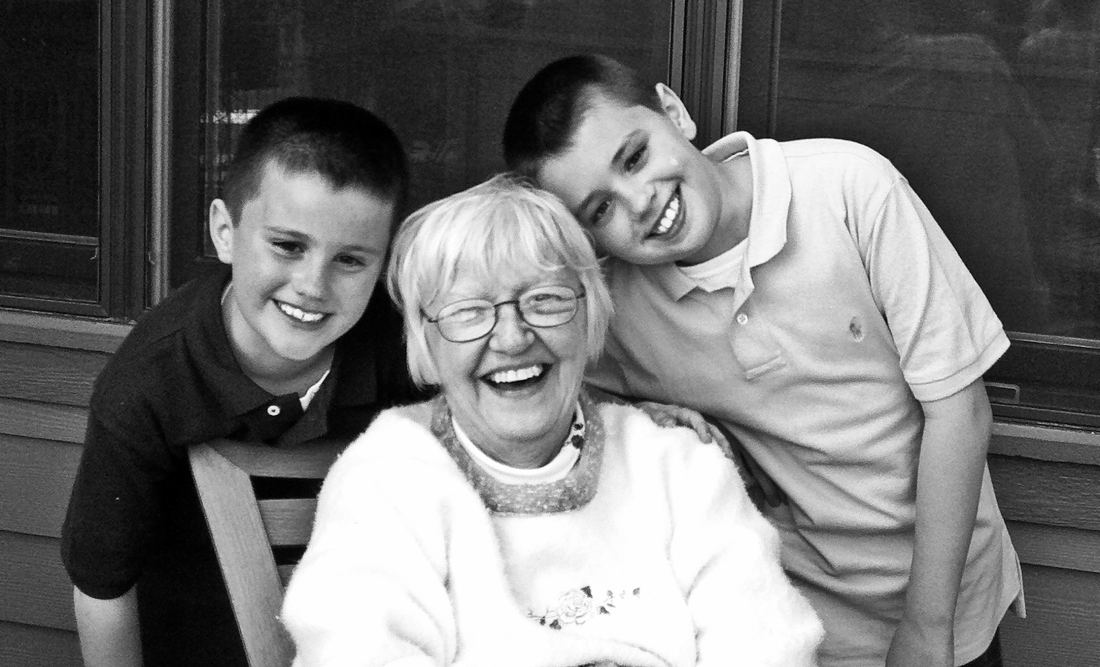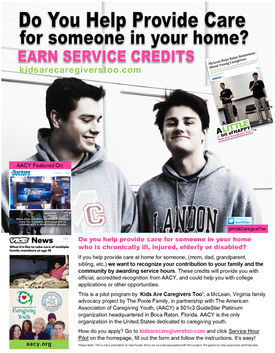There are more than 5.4 million kids in the United States who live with and help provide daily care for household members with a physical or mental illness, disability, or frailty associated with aging, disease, or other condition.
Five million is more than the total student population in New York City, Chicago, and D.C. combined. Evenly divided between girls and boys, about one-third are ages 8-11, nearly 40 percent are aged 12-15.
Caregiving impacts children's lives - both positively and negatively. They have different life experiences than their non-caregiving peers. The family member is often a parent or grandparent with a condition such as Alzheimer's disease or dementia.
- The National Alliance for Caregiving
Caregiving impacts children's lives - both positively and negatively. They have different life experiences than their non-caregiving peers. The family member is often a parent or grandparent with a condition such as Alzheimer's disease or dementia.
- The National Alliance for Caregiving
|
|
Helping care for our grandmother was unspeakably hard. Other kids are going through this, and other kids have it way worse than we did. Think about it. Millions of kids live in households that provide significant care to one or more family members. The majority deal with problems related to aging, but many of them deal with things like Cancer, Huntington's Disease, ALS, Substance Abuse, Mental Illness, adversity due to Military Service, and more. |
Challenges Caregiving Youth Face:
| Caregiving is stressful; it is outside of normal “kid stuff”/adolescent issues
| Kids miss a lot of school days because of their caregiving
| They often can’t participate in sports or after-school activities
| They lack traditional support from their parents to get extra homework help or just emotional support in general
| Hopelessness - They don’t see a way out of situation, no vision for future
| In many cases they can’t invite friends over to their house because of the situation; they can’t go to others houses
| Kids feel like they have lost their childhood - saddled with adult responsibilities beyond their control
| They are constantly concerned about the person they are helping, about what could be happening at home when they aren’t there. Worry affects all parts of their lives & has negative health consequences
| Families too busy to pay attention to kids
| Powerful sense of isolation and feeling alone. “Who else does this” they wonder? Non-caregiving friends don’t understand
| Feelings of anger, sadness, anxiety, shame, embarrassment, and depression - suicide risk
| Getting bullied is common
| Grades suffer, dropout rates measurably higher, college out of question for many based on obligations and finances
| Fear of outside help/distress about discussing their situation with others in authority, teachers, counselors, etc.
| Kids miss a lot of school days because of their caregiving
| They often can’t participate in sports or after-school activities
| They lack traditional support from their parents to get extra homework help or just emotional support in general
| Hopelessness - They don’t see a way out of situation, no vision for future
| In many cases they can’t invite friends over to their house because of the situation; they can’t go to others houses
| Kids feel like they have lost their childhood - saddled with adult responsibilities beyond their control
| They are constantly concerned about the person they are helping, about what could be happening at home when they aren’t there. Worry affects all parts of their lives & has negative health consequences
| Families too busy to pay attention to kids
| Powerful sense of isolation and feeling alone. “Who else does this” they wonder? Non-caregiving friends don’t understand
| Feelings of anger, sadness, anxiety, shame, embarrassment, and depression - suicide risk
| Getting bullied is common
| Grades suffer, dropout rates measurably higher, college out of question for many based on obligations and finances
| Fear of outside help/distress about discussing their situation with others in authority, teachers, counselors, etc.
Reasons Why Caregiving Youth are Awesome & Need Recognition & Opportunities
| On the positive side, youth caregivers tend to mature quicker
| They are more compassionate than their non-caregiving peers
| They build stronger relationships with adults
| Youth caregivers are considerably more altruistic as a whole
| These kids tend to show a disinterest in their own needs, and selfless concern for the well-being of others
| They tend to be very unselfish kids (They have a greater potential to mature into generous, caring adults, who have altruistic leanings and could help solve many of the problems they've already experienced in their young lives - healthcare issues, caregiving, poverty, legal issues, medicine, etc.)
| They are more compassionate than their non-caregiving peers
| They build stronger relationships with adults
| Youth caregivers are considerably more altruistic as a whole
| These kids tend to show a disinterest in their own needs, and selfless concern for the well-being of others
| They tend to be very unselfish kids (They have a greater potential to mature into generous, caring adults, who have altruistic leanings and could help solve many of the problems they've already experienced in their young lives - healthcare issues, caregiving, poverty, legal issues, medicine, etc.)
It’s not all bad | In other words, kids who help provide care for others tend to be really “nice kids” with a lot of potential in life. This potential needs nurturing, and they need support and encouragement at school, in the community, in places of worship, and at home to succeed academically, personally and professionally.
|
Press Release | McLean Brothers, High School Students Charlie, and A.J. Poole Raise Awareness for Caregiving Youth
The boys shared their story on caregiving for their grandmother through Alzheimer’s at the 6th Annual Brain Bowl event in Boca Raton, FL and are launching a local pilot program to help recognize caregiving youth. |
1. Recognize
Bring Kids into the National Conversation on Caregiving. Support & amplify legislation to benefit Caregiving Youth. Kids should be a part of the conversation whenever anyone talks about family caregiving. Children living in a home where someone is receiving a considerable amount of care deserve recognition for their contributions. They deserve a seat when discussing caregiving legislation and programs so they can also be part of the solution. Awareness and recognition are key. Kids Are Caregivers Too.
2. Identify
Identify caregiving youth through local/national surveys and provide support for them in schools, healthcare settings, and at home.
3. Support
Persuade the adults and peers to support youth caregivers in schools. Create school programs and teacher/counselor education, and build support resources between the healthcare industry, local and federal programs, schools, and the community. Build pathways and programs to connect kids who provide care with resources that could help them in school, home, and life.
4. Reward
We want kids to get Service Learning Hours and Recognition for caregiving in their homes by their schools. The goal is for all children who have or are currently caregiving for an Alzheimer's patient or anyone with a serious illness in their home to receive credit for Service-Learning and consideration for Service Scholarships and State and National Awards. Recognition Rewards from any institution where service is part of a curriculum. We believe that kids who provide care supply an invaluable Community Service and should be recognized and rewarded the same as any student who participates in scouting, band, sports, or other recognized school activity. We will assist other organizations working on solutions, recognition, and support for child caregivers.
5. Recovery & Opportunity
There are resources posted on this site, including research, articles, videos, and studies about the lingering effects of being a part of a family caregiving team to an Alzheimer's or Dementia patient, someone with a serious disability or debilitating disease, especially in the end stages, especially in the home. Having kids know they're not alone, and others do this too, is helpful.
Bring Kids into the National Conversation on Caregiving. Support & amplify legislation to benefit Caregiving Youth. Kids should be a part of the conversation whenever anyone talks about family caregiving. Children living in a home where someone is receiving a considerable amount of care deserve recognition for their contributions. They deserve a seat when discussing caregiving legislation and programs so they can also be part of the solution. Awareness and recognition are key. Kids Are Caregivers Too.
2. Identify
Identify caregiving youth through local/national surveys and provide support for them in schools, healthcare settings, and at home.
3. Support
Persuade the adults and peers to support youth caregivers in schools. Create school programs and teacher/counselor education, and build support resources between the healthcare industry, local and federal programs, schools, and the community. Build pathways and programs to connect kids who provide care with resources that could help them in school, home, and life.
4. Reward
We want kids to get Service Learning Hours and Recognition for caregiving in their homes by their schools. The goal is for all children who have or are currently caregiving for an Alzheimer's patient or anyone with a serious illness in their home to receive credit for Service-Learning and consideration for Service Scholarships and State and National Awards. Recognition Rewards from any institution where service is part of a curriculum. We believe that kids who provide care supply an invaluable Community Service and should be recognized and rewarded the same as any student who participates in scouting, band, sports, or other recognized school activity. We will assist other organizations working on solutions, recognition, and support for child caregivers.
5. Recovery & Opportunity
There are resources posted on this site, including research, articles, videos, and studies about the lingering effects of being a part of a family caregiving team to an Alzheimer's or Dementia patient, someone with a serious disability or debilitating disease, especially in the end stages, especially in the home. Having kids know they're not alone, and others do this too, is helpful.
No matter what, caregiving for a person who has Alzheimer's or Dementia in your home will fundamentally be a part of who kids are and who they grow up to be, both good and bad. How children view their experience is one of the most important parts of recovery. Kids who provide care should feel proud of what they've accomplished, and their silent contributions should be acknowledged and rewarded by their teachers, schools, houses of worship, and community. The plan is to promote ways to turn their caregiving days into a recognized skill that they can use to launch themselves into a successful future by partnering with others to make it happen. If you have an idea or want to help, contact us.
A great way to connect to others who are interested in Caregiving Youth issues is through social media. Share your stories, search the hashtags, like - share - post - support each other.
@kidscaregivetoo #kidsarecaregiverstoo #caregivingyouth #youngcarers #AwareTheyCare












